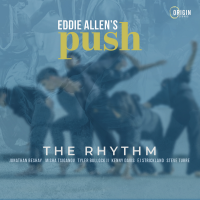
It's not often that you get to talk to someone 91 years old, not to mention one who has played, written or arranged for Duke Ellington and hundreds of other jazz luminaries. So when Gerald Wilson is on the telephone from his home in Los Angeles, you generally let the man talk without interruption. Not that it was necessary to interrupt Gerald Wilson: For a guy his age, his ability to recall names and dates was pretty spot-on and he gets his stories out before losing the thread of the narrative.
Ostensibly, we were to talk about Wilson's wonderful new album, 'Detroit,' on Mack Avenue Records, but the album title alone puts Wilson in a storytelling mode as he recalls going to the city's famed Cass Tech High School (from 1934 to '39), which at the time was second in stature only to Juilliard as a music school. Wilson tells his tales with a soft twang that hints at his upbringing in Shelby, Miss., and his time in Memphis before spending his formative years in Detroit; it projects a gentle musicality that no doubt inspired students when he taught at UCLA for 22 years, retiring in 2008 and going out as the Teacher of the Year, or charmed listeners when he DJ'd for KBCA-FM from 1969 to 1976.
At age 9, Wilson himself remembers listening to Cotton Club radio broadcasts of Duke Ellington, and this, along with Duke's records, gave him the bug to write and arrange. By the time he hit Cass High, he had learned music from his mom, a pianist, but his subsequent education at the school taught him harmony, orchestration, percussion, theory and the rest. Wilson, known for creating rich eight- and even 10-part voicings to create chords in his bands, still puts these lessons to use today.
With someone who has lived such a full and lengthy life, it's interesting that Gerald Wilson considers himself “lucky to be at the right place at the right time" instead of just believing that he outlasted everyone else. “I got that from Ellington," he explains, “when I asked him how he had gotten so successful. He said he was on the audition for the Cotton Club. He was late, but so were the talent buyers, so that's how he got the job [that truly launched his career]."
For Wilson, this serendipity worked, too. He had gone to the Chicago World's Fair as a teenager and was thrilled by the less segregated life in the North and wanted to move to the Windy City. His mother instead sent him to Detroit and Cass, where it so happened he got to spend time with many of the great jazzmen of the day, including the Dorsey brothers and Jimmie Lunceford, who had met the young Wilson in Memphis and then hired him out of Cass before he graduated. During his three-year tenure with the Lunceford band as trumpeter, Wilson ended up writing such hits for the band as 'Yard Dog Musurka' and 'Hi Spook.'
Other career highlights include writing or arranging for Zubin Mehta and the Los Angeles Philharmonic, Redd Foxx's television shows, Cab Calloway, Count Basie, Nancy Wilson, Ray Charles, Ben Webster and Dizzy Gillespie. He even did an adaptation of 'Carmen' for Tweety Bird (no kidding!). Yet because Wilson often worked behind the scenes, he didn't attain the renown of some of the more famous musicians who hired him or used his songs. Even so, he was well established in the jazz community, and after a brief time away from music in the '50s he successfully launched a big band and recorded such standouts as 'You Better Believe It' and 'Portraits' for Pacific Jazz in the '60s. He continued to work in film and television as well -- even doing some acting.
He's recorded acclaimed albums for Mack Avenue and MAMA since the '80s, won a Jazz Master Fellowship grant from the National Endowment of the Arts in 1990 and taught countless seminars at various schools. He's also made a cottage industry out of writing music commissions for cities, Detroit being just one of three in the past three years -- the others are Chicago and Monterey, Calif. (site of the long-running jazz festival). “It's keeping me busy," Wilson says with a chuckle about his continuing career. “I just finished some music for Wynton Marsalis, two new numbers that he hasn't even played yet. I'm just having a ball."
On 'Detroit,' recorded mostly with his longstanding orchestra plus a few tunes with a New York band, Wilson writes a suite of new songs by drawing inspiration for a variety places in his old hometown. Wilson also looks to many of his fellow musicians, including “younger guys" like Benny Golson (Wilson is one of the few who could call Golson, 81, a younger guy) and 'Cass Tech' has just a hint of Golson's 'Along Came Betty.' There's also 'Miss Gretchen,' which uses some harmonic touches from Billy Strayhorn's 'Chelsea Bridge.' But these are musical nods to people he knows, and much of the material is pure Gerald Wilson, which encompasses the entire history of jazz because he's been there and seen it all firsthand.
“I don't do anything special, really" he says about his longevity. “I just go about my business. It's one day at a time, and I thank God every day for letting me be here on this wonderful planet that we are on." But when pressed, it comes to light that his mother lived until age 97. So we could have Gerald Wilson with us for a while to come, and the world is a better, more musical place for it.
What our friends at All About Jazz are up to:
ARTICLES
The Year Classic Albums Were Born
Bobby Bradford: Self-Determination in the Great Basin
No Vanity Here: New Albums by Women Singers
REVIEWS
Komeda Project, Requiem
Jackie Ryan, Doozy
Lee Shaw Trio, Blossom
For more information contact All About Jazz @ Spinner.




























